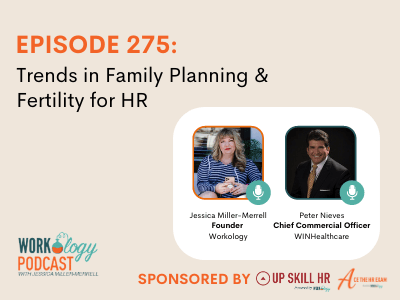A growing number of employers in the U.S. are offering family-friendly benefits such as fertility services, paid leave and flexible scheduling to accommodate employees in today’s competitive labor market. According to a 2018 report from the International Foundation of Employee Benefit Plans, nearly one-third (31%) of employers offer some sort of fertility benefit—up from 24% in 2016. Employers most commonly cover in vitro fertilization (IVF) treatments (23%), fertility medications (18%), genetic testing to determine infertility issues (15%), non-IVF fertility treatments (13%), visits with counselors (9%) and egg harvesting or freezing services (7%).
Episode 275: Trends in Family Planning & Fertility for HR With Peter Nieves (@PeterNieves)
I spoke to Peter Nieves, Chief Commercial Officer at WINHealthcare and WINFertility. Peter has 27 years of experience building businesses in employer consulting, population health management, and virtual care services.
I asked Peter how his company works with employers. “WIN has been doing this for almost 22 years, very different from any other fertility management organizations that exist today. Many health plans have chosen us as their fertility partner, some companies offer our services as a buy up for their existing health plan. We offer clinical support; we have nurses as advocates for the patients and their partners to help them overcome all the anxiety, answer questions, match them up with doctors…anything we can do to lower stress for employees using fertility services.”
I asked if the competition for talent is driving this trend or is there more to it. Peter said, “Having been in the consulting world and working with employers for most of my career, in a strong talent marketplace what attracts employees is what they need. Fertility services rank among the top services requested by employees today. Millennials who are waiting later in life to start families, the LGBTQ+ community, single parenting, couples with fertility issues…empowering those who would like to focus on their career but may harvest their eggs at 26 versus waiting until 36 so egg freezing is also in demand. Employers want to bring employees in and they are responding to what employees want.”
Peter added, “we do a lot of counseling and support and there is enormous trust established with our nurse care managers. We started a video chat because we had so many requests from new families who wanted their nurse care manager to meet their babies.”
What does rolling out fertility benefits look like for companies? “Cost is certainly something to focus on. HR wants to attract talent, but they have to stay on budget. There are costs even if you’re not providing a program. My wife and I had a set of twins without fertility support…my twins were born early and in the NICU for a month, which could have been hundreds of thousands of dollars per child, but it was covered under health insurance. So a fertility program isn’t a pure cost; having it as a resource could help save employees and employers money down the line.”
Future Trends in Nontraditional Benefit Services
There are so many more employers offering fertility and family planning as a benefit, more recently we’ve seen small and mid-sized businesses across industries begin to offer this as a benefit. Peter explained, “as more companies are offering this benefit, we’ve seen a demand for employers to expand their services to unique benefits that support work-life balance…things outside of fertility and family planning.”
Peter added that “more employers are offering this type of benefit but not all are managing it or educating employees about what is available to them. The trend here is that more companies are dedicating benefit managers to family building, planning, fertility, and other services that can help employees.”
For anyone who has struggled with fertility issues, you already know how stressful it can be. And it’s not just about traditional fertility care – on behalf of our employers we also have to consider family planning support for same-sex couples with regards to surrogacy and adoption. Having support, resources, and benefits from employers can be so valuable to an employer brand, as well as employee retention. Trends are often trending for a reason, and with the global health crisis, this year employers are hyper-focused on employee wellness and care. I’m so pleased to have had the opportunity to speak with Peter Nieves about his experience in this area.
Connect with Peter Nieves.
RECOMMENDED RESOURCES
– Parental Work Perks That Don’t Work
– Ep 144 – Women at Work: How to Support New Parents and Life Changes
How to Subscribe to the Workology Podcast
Stitcher | PocketCast | iTunes | Podcast RSS | Google Play | YouTube | TuneIn
Find out how to be a guest on the Workology Podcast.








